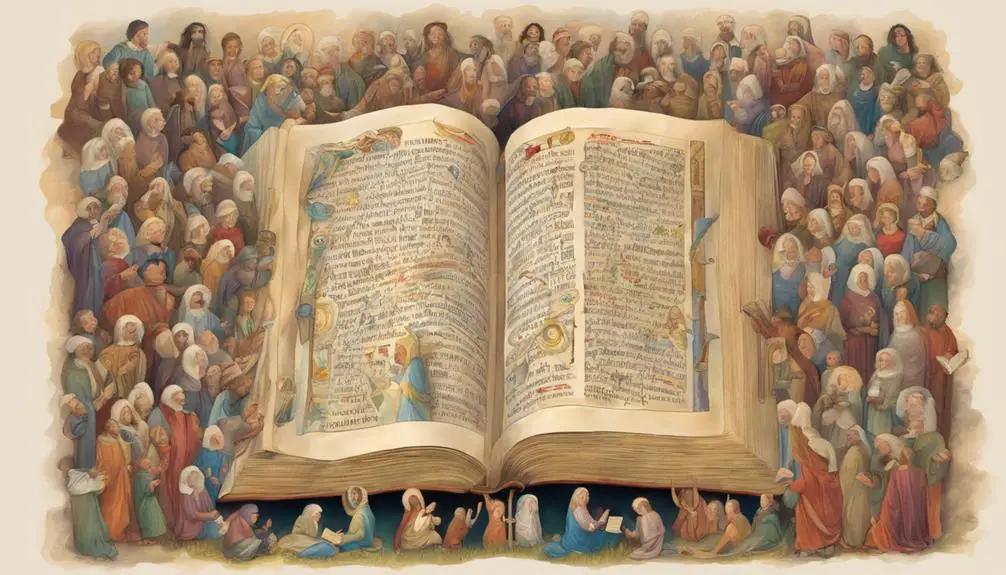Take a dive into the Bible's shortest Psalm, and uncover the profound wisdom it holds in its succinct verses.

What Is the Shortest Psalm in the Bible
You might think that finding the shortest Psalm in the Bible is like hunting for the smallest needle in a haystack of divine haystacks. But, let's set off on this exploration.
You'll discover the answer is rather simple, and it's not Psalm 23, despite its popularity. The brevity of this particular Psalm is striking, yet its condensed wisdom holds a profound message.
But, what could this shortest Psalm be, and why does its succinctness matter? Well, allow your curiosity to lead you to the answer in the lines that follow.
Key Takeaways
- Psalm 117 is the shortest Psalm in the Bible, encompassing just two verses.
- Despite its brevity, Psalm 117 conveys a profound message of universal praise and God's enduring truth.
- The Psalm's succinctness illustrates the art of meaningful, concise communication.
- Its universal message transcends cultural and linguistic boundaries, emphasizing a call for worship beyond limitations.
Understanding the Psalms

To truly appreciate the shortest Psalm in the Bible, you need to first understand the nature and purpose of the Psalms themselves. Rooted in ancient Hebrew culture, Psalms are lyrical expressions of human emotions—despair, joy, gratitude, or confusion—brought before God. They're not just historical documents, but timeless poems capturing the heart's profound depths.
Now, let's delve into the 'Psalms' authorship. While King David is often recognized as the primary author, it's important to note that other contributors include Asaph, the sons of Korah, and even Moses. Each author's distinctive life experiences and their relationship with God influence the emotional depth in Psalms.
You'll find that Psalms' emotional depth is its distinguishing factor. These aren't just words, they're the raw, unfiltered expressions of human heart and soul. Whether it's David's cries of repentance or Asaph's songs of praise, each Psalm resonates with a unique emotional intensity. It's this emotional depth that enables readers across centuries to identify with the Psalms, finding comfort, encouragement, and wisdom in their words.
Psalm Lengths: A Comparison

Diving into the comparison of Psalm lengths, you'll quickly notice a wide range from the succinct, two-verse Psalm 117 to the extensively detailed, 176-verse Psalm 119. This spectrum of length not only indicates the diversity in the content of the psalms but also reveals the depth of spiritual and emotional experiences encapsulated in these ancient texts.
Psalm categorization plays a significant role in understanding this variety. Psalms are grouped into various categories, such as hymns, laments, and royal psalms, each with their unique characteristics. For instance, hymns typically express praise and thanksgiving, while laments often depict sorrow and pleas for help. The lengths of these psalms can vary dramatically depending on the complexity and intensity of the emotions being expressed.
Biblical chronology also heavily influences Psalm lengths. Earlier psalms, closer to the dawn of the Israelite monarchy, tend to be shorter and more straightforward, reflecting a society in its infancy. In contrast, later psalms, written during or after the Exile, are typically longer and more nuanced, mirroring a people grappling with complex theological questions.
In this way, the varying lengths of the psalms serve as a window into the spiritual and historical journey of the Israelite people.
Revealing the Shortest Psalm

Now, let's turn our attention to the shortest psalm in the Bible, Psalm 117, and unpack its significance despite its brevity. Comprising only two verses, it's a testament to Biblical brevity. However, don't let its succinctness fool you. It's packed with profound messages that resonate across numerous Psalm translations.
Psalm 117's brevity isn't a weakness but a strength. This tiny psalm teaches us the art of saying more with less, reflecting the essence of meaningful communication. It's a powerful reminder that the core messages of faith, love, and worship don't need lengthy texts but can be delivered elegantly and efficiently.
Regardless of the Psalm translations you study, the central message of Psalm 117 remains the same. It calls for all nations to praise the Lord for His merciful kindness and truth. This universal call to praise transcends cultural and linguistic boundaries, making its brevity even more impactful.
Interpreting the Shortest Psalm

Unpacking the concise language of Psalm 117, you'll discover a world of meaning in its succinct verses. The Psalm's authorship, although unknown, is often credited to King David. Most Biblical translations preserve the Psalm's original intent, expressing unconditional praise and gratitude towards God.
Now, let's delve into an analysis of the Psalm's two verses. Below is a table summarizing the interpretation:
Verse |
Interpretation |
|---|---|
1 |
Calls all nations and people to praise the Lord for His merciful kindness |
2 |
Emphasizes God's truth enduring forever, suggesting His promises are eternal |
Examining this, you can see that although short, Psalm 117 is comprehensive in its message. It's a universal call to worship, transcending cultural and geographical boundaries. The second verse reassures us of God's unwavering truth, hinting at the eternal nature of His covenant.
The Shortest Psalm's Impact on Faith

Despite its brevity, Psalm 117's profound message has had a significant influence on the faith of many believers, inspiring them to live a life of gratitude and unwavering trust in God's eternal truth. This concise scripture, with its profound implications, serves as a fundamental tool for faith reinforcement. It encourages you to acknowledge the boundless mercy of God and to respond with heartfelt praise.
This psalm's potency rests in its spiritual minimalism. It strips down the essence of faith to its core elements: recognizing God's steadfast love and eternal truth. It doesn't demand you to comprehend complex theologies or dive into elaborate rituals. Instead, it invites you to embrace a simple, yet profound, faith that transcends cultural, historical, or theological boundaries.
Therefore, Psalm 117 amplifies your faith by reinforcing your trust in God's unfailing love and eternal truth. It provides a roadmap for a lifestyle of gratitudinal worship and unshakeable trust. Even though it's the shortest psalm, its profound message resonates deeply within the hearts of believers, creating a profound impact on their faith journey.
Frequently Asked Questions
Who Are the Main Authors of the Psalms?"
You're asking about the main authors of the Psalms. Most were penned under David's influence, making him the primary author. His psalms reflect deep emotions and personal experiences.
Another key contributor was Asaph, a Levite music director. Asaph's contributions include Psalms 50 and 73-83, reflecting his unique perspective and spiritual insight.
Although there are other authors, David's and Asaph's influences are most prevalent in the Book of Psalms.
What Are the Different Types of Psalms?"
You're exploring the different types of Psalms, aren't you? They're fascinating in their literary structure and cultural impact. Psalms are classified into categories like hymns, laments, thanksgiving, royal, wisdom, and pilgrimage.
Each type plays its role in the tapestry of the Psalms, depicting a range of human emotions and experiences. Their variety and depth make them a significant part of religious and literary studies.
What Is the Longest Psalm in the Bible?"
You're curious about the longest Psalm in the Bible. It's Psalm 119, a unique piece with a significant structure.
When you delve into a Psalm structure analysis, you'll find it's an acrostic poem divided into 22 stanzas. With its profound spiritual impact, it emphasizes the power of God's word.
It's longer than any other Psalm, making it a fascinating study for those interested in biblical literature.
How Has the Shortest Psalm Influenced Contemporary Religious Music?"
The Shortest Psalm's legacy has greatly influenced contemporary religious music.
You'll often find its verses transformed into lyrics, providing depth and spiritual resonance.
Its succinct, powerful message is frequently adapted to song, enabling contemporary audiences to connect with ancient wisdom in a modern, accessible way.
It's not just a Psalm; it's a profound piece of literature that continues to be a wellspring of inspiration for musicians and songwriters.
Are There Any Significant Differences in the Way Different Religious Denominations Interpret the Shortest Psalm?"
You'll find denominational perspectives can lead to interpretational variations of any biblical text.
While some may see the shortest psalm as a simple prayer, others might interpret it as a deeper theological statement.
It's important to remember, each denomination's interpretation reflects its unique beliefs and traditions.
So, yes, there are significant differences in interpretations across different religious denominations.
These differences, however, enrich our understanding of the psalm's depth.
Conclusion
There you have it! The shortest Psalm in the Bible is Psalm 117. With only two verses, it conveys a powerful message of God's steadfast love and faithfulness.
Its brevity doesn't lessen its impact – instead, it highlights the potency of its message. Regardless of length, every Psalm provides insight into our faith, offering comfort, guidance, and wisdom.
Remember, it's not the length that matters, but the depth of the message within.



Sign up